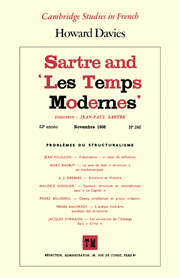Book contents
- Frontmatter
- Contents
- GENERAL EDITOR'S PREFACE
- Preface
- Acknowledgements
- Introduction
- 1 The first six years: the participation of Leiris and Lévi-Strauss
- 2 From 1951 to 1956: the rise of structuralism
- 3 Algeria: intellectual rivalries in time of war
- 4 The critique of academic knowledge
- Conclusion
- Appendix 1 Composition of the Editorial Board
- Appendix 2 Circulation figures
- Appendix 3 Categories of material to be found in Les Temps Modernes
- Appendix 4 Articles pertaining to academic anthropology
- Appendix 5 Special issues
- Notes
- Select bibliography
- Name index
- Subject index
- Cambridge Studies in French
2 - From 1951 to 1956: the rise of structuralism
Published online by Cambridge University Press: 05 February 2012
- Frontmatter
- Contents
- GENERAL EDITOR'S PREFACE
- Preface
- Acknowledgements
- Introduction
- 1 The first six years: the participation of Leiris and Lévi-Strauss
- 2 From 1951 to 1956: the rise of structuralism
- 3 Algeria: intellectual rivalries in time of war
- 4 The critique of academic knowledge
- Conclusion
- Appendix 1 Composition of the Editorial Board
- Appendix 2 Circulation figures
- Appendix 3 Categories of material to be found in Les Temps Modernes
- Appendix 4 Articles pertaining to academic anthropology
- Appendix 5 Special issues
- Notes
- Select bibliography
- Name index
- Subject index
- Cambridge Studies in French
Summary
These are the years of the consolidation of Lévi-Strauss's innovations in anthropological theory. This does not prevent him from maintaining a presence in TM and, in July 1956, Pouillon undertakes a respectful evaluation of his work, one which usefully highlights all that separates it from the synthetic anthropology. Leiris, for his part, makes only literary contributions, but with Georges Balandier, Verrier Elwin and Margaret Mead, the review is able to feature other ethnographic research. Quantitatively, there is no increase in anthropological material and the main emphasis of this half-decade is political.
A brief comment on the editorial personnel is relevant here. Of the original Board, Aron and Ollivier had resigned in June 1946. Thereafter, and in fact until January 1954, no Board is named, effective control and political editorship passing initially to Merleau-Ponty. After 1949, however, the year in which he gives up the legal responsibility of the position of gérant, Merleau-Ponty chooses to slip steadily into the background. So much so that when this second period opens there is a general loss of direction which Sartre subsequently describes in the following way: ‘Ainsi découvrions-nous Tun et l'autre que la revue avait au cours de ces six années acquis une sorte d'indépendance et qu'elle nous menait autant que nous la menions. Bref, pendant l'interrègne, entre 1950 et 1952, un navire sans capitaine recruta lui-même des officiers qui en évitèrent la perdition.’
- Type
- Chapter
- Information
- Sartre and 'Les Temps Modernes' , pp. 40 - 74Publisher: Cambridge University PressPrint publication year: 1987

